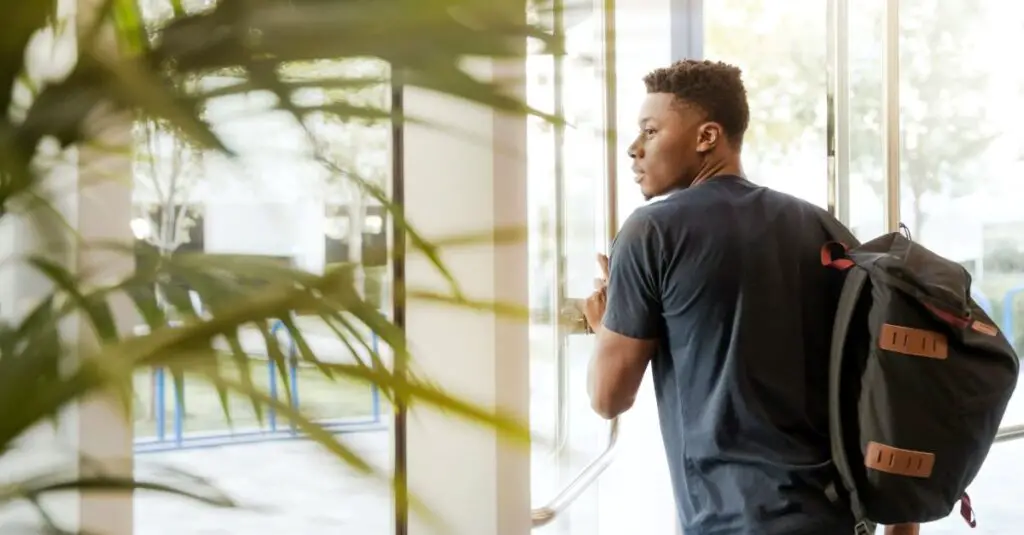Autism After High School: Choosing College Can Be Right Choice
Transitioning from high school to the next stage in life can be a wild ride, filled with excitement, nerves, and countless growth opportunities. For many individuals, the next logical step is attending college, where independence and academic pursuits take center stage.
 But for individuals on the spectrum, autism after 18 or following the high school transition can bring its own set of unique challenges and exciting possibilities.
But for individuals on the spectrum, autism after 18 or following the high school transition can bring its own set of unique challenges and exciting possibilities.
Parents and autistic individuals alike may wonder whether college is possible with autism after high school. They may also have concerns as to whether college for autistic students can be a successful experience.
However, the bigger question should not be whether a person with autism in college can be successful, but whether a specific individual can be.
After all, college in general is not for everyone, and there are more options than ever for a neurotypical individual or for one with autism after 18 (or the age following graduation).
So, let’s consider for the sake of this blog that the young adult has decided that pursuing higher education at one of the colleges for autistic students is their goal. (And please understand that not every autistic individual who wants to attend college wants or needs to choose one that has specialty programs or supports. In many instances, that may not be needed. Just wanted to get that point addressed straight up.)
First of all, congratulations on making that milestone decision! That was a difficult decision to make for anyone with autism after high school, especially for all those new graduates who may faced a few challenging years of their general education due to Covid-19.
The next big decision to make for a person with autism after high school is determining which college to attend.
Again, that is a life-changing challenge for anyone, but for an individual on the spectrum, it is extremely important to review any potential hurdles, the support systems available, and the incredible potential for growth and success.

Fortunately, my college choice as a person with autism after high school wasn’t difficult. I wasn’t really afraid to attend classes with autism in college because I was already familiar with the campus and the people.
That’s because I chose to attend a community college nearby home and one that I was already familiar with.
This particular two-year college had summer classes for young people, called “College for Kids,” and I started participating in it around age 12.
Students signed up for courses, much like they would with a college schedule, and teachers and professors would teach subjects you signed up for. I did a lot of science experiments and physical activities.
I also learned how to make homemade ice cream, swam a lot in their Olympic-sized pool, and learned how to play ping pong (which piqued my interest in tennis later). They had all kinds of great stuff there and I was glad I got to participate for several years.
This helped me feel a lot more comfortable and familiar with this place so I could focus on my grades and I excelled at all my classes.
In addition, I took dual-enrollment courses while still in high school. While I stayed at my high school for the classes, it did let me get familiar with the college portal and the classroom websites used by the professors. That helped when I began college full-time. Even though it wasn’t one of the declared colleges for autistic students, I knew up front that there was support if I needed it.
I realize not everyone has this opportunity, but I still recommend trying to familiarize yourself with a campus through orientations, tours, freshman activities, or anything that can help with overcoming the unknown and lessen feelings of awkwardness or anxiety. 
Transition planning with autism after high school to college is like strapping on a jetpack before launching into a strange new world. It’s all about preparing for the unknown and building the necessary skills to succeed.
So, what does that involve? Well, it’s a team effort that includes the student, their family, educators, and support professionals.
As a future college student, consider these important steps in the process so you can knock your experience out of the park.
4 Top Skills Needed with Autism After 18 for Transitioning to College:
Build self-advocacy skills. An aspiring college student with autism should be able to express his/her needs, preferences, and goals.
It’s all about empowering yourself to stand up and self-advocate and navigate the college experience if you have autism in college with confidence.
- Develop independent living skills. College life means fending for yourself in many ways. From managing time like a pro to staying organized and taking care of daily tasks, these skills are vital for a successful college journey. And they are needed regardless of whether you choose one of the autism schools with special programs or focus, or are going in without any extra support in mind.
As a person with autism after high school, be sure you have these essential skills in independence before going off to a new place far from your support structure.
- Familiarize yourself with the college environment ahead of time. College campuses can feel like giant mazes, especially for someone new to the scene. That’s why campus visits, orientation programs, and virtual tours can be a game-changer.
They help any new students become comfortable with their surroundings, find their way around, and start picturing themselves as part of the vibrant campus community.
- Navigate academic challenges. Ah, academics—sometimes a blessing, sometimes a beast. College academics can be a whole different ball game compared to high school.
And for individuals with autism, there might be some unique challenges to tackle like asking for assistance as needed, utilizing a tutor, and participating in study groups.
Individuals with autism in college may have these additional challenges:
- Executive functioning difficulties. This fancy term refers to challenges with planning, prioritizing, and organizing tasks. It’s like trying to juggle flaming torches while riding a unicycle.
But fear not, because there are strategies and resources available to help students conquer these hurdles.
- Sensory sensitivities. Picture this: a crowded lecture hall with bright lights and a cacophony of voices. For someone with sensory sensitivities, it can feel like an assault on the senses.
That’s where accommodations like preferential seating or noise-canceling headphones come into play, creating a more comfortable learning environment.
- Communication barriers. Some individuals with autism may face hurdles when it comes to verbal and nonverbal communication.
Speaking up in class or participating in group discussions might be a bit tricky. Luckily, alternative communication methods and accommodations like note-taking support can make all the difference. All you have to do is ASK.
- Accessing support services. Colleges and universities are finally waking up to the importance of inclusive education.
That means they’re stepping up their game and providing support services for students with disabilities.
7 Examples of Support Services to Help College Students with Autism:
- Disability resource centers. These magical places offer academic accommodations, assistive technologies, and specialized support.
They’re like the superheroes of the college support system, ready to swoop in and ensure that students with autism have the tools they need to thrive academically.
- Peer mentorship programs. Sometimes, a little guidance from a friendly face can make all the difference. That’s where peer mentorship programs come in.
They match students with mentors who have walked the college path before them. These mentors can provide valuable insights, offer support, and help navigate the ins and outs of campus life.
- Counseling and psychological services. College life can be stressful for anyone, and that’s why counseling and psychological services are available on campus.
These services provide a safe space for students to express their concerns, seek guidance, and develop coping strategies.
Mental health is just as important as academic success, and these support services recognize that.
Don’t hide that you have autism after high school, if possible. Letting those who can help you be successful can make the higher education journey easier overall.
- Promoting social inclusion. College isn’t just about hitting the books; it’s also about making lifelong connections and finding your tribe.
But for individuals with autism, socializing and making friends can be a significant challenge.
- Autism awareness campaigns. It’s all about breaking down barriers and promoting understanding and acceptance.
Autism awareness campaigns can help educate the campus community about autism, dispel stereotypes, and foster a more inclusive environment for everyone.
- Peer support groups. Sometimes, finding a sense of belonging starts with connecting with others who share similar experiences.
Peer support groups specifically for individuals with autism can provide a safe space to share, bond, and build friendships. It’s like finding a second family on campus. These groups, in turn, can also help with building self-identity.
- Inclusive extracurricular activities. Colleges offer a wide variety of extracurricular activities, clubs, and events.
Creating a diverse range of inclusive options ensures that individuals with autism can find activities that match their interests.
Whether it’s a gaming club, an art group, or a sports team, these activities provide opportunities for socialization and a chance to pursue passions outside of academics.
Transitioning from high school to having autism in college is a thrilling adventure, and for individuals with autism, it’s a journey filled with unique challenges and hopefully significant triumphs.
By recognizing the individuality of each person with autism and providing the necessary support systems, colleges and universities can create an environment where these students can thrive.
Also, if you (or your parents) feel that college might not work with your needs, don’t forgo the opportunity to attend college altogether.
A growing number of campuses are offering special support programs and even certificate programs for adults with neurodivergent students. The University of North Texas has created a program called Engage, for example. There are many others across the country, so this is just one example.
So, to all those embarking on this exciting journey—embrace it, own it, and let your unique brilliance shine as you make your mark in the world of higher education.
College experience awaits, and with the right support, you have everything you need to soar!
Autism in Adults: Living, Learning, and Overcoming Challenges for a Fulfilled Life
Autism in adults requires additional support and coping skills to achieve independence in today’s world. Learn more about ways adults can live fulfilled lives and the challenges they face.
- 14 Practical Ways for Staying Motivated to Unlock Full Potential
- Autism and Independence: 7 Skills That Empower Individuals to Thrive
- Dangers of Social Media Addiction: How To Leave the Screens And Face the Real World
- Autism Volunteer Opportunities: 5 Ways Helping Others Fosters Acceptance
- 8 Heartfelt Ways Autism Emotional Support Animals Transform Lives
- Autism in the Future: Optimism for Improved Perception and Embracement
- Autism and AI: 7 Discoveries About the Surprise Pairing and Profound Impact
- Are You An Adult With Autism? Here Are 6 Signs
- Autism vs Asperger’s Syndrome: What You Need to Know
- Autism Disclosure: Is Revealing Your Disorder Helpful or Hurtful?
- Work and Autism: What Employers Should Know About Hiring People Like Me
- Drivers with Autism Can Achieve Success Behind the Wheel